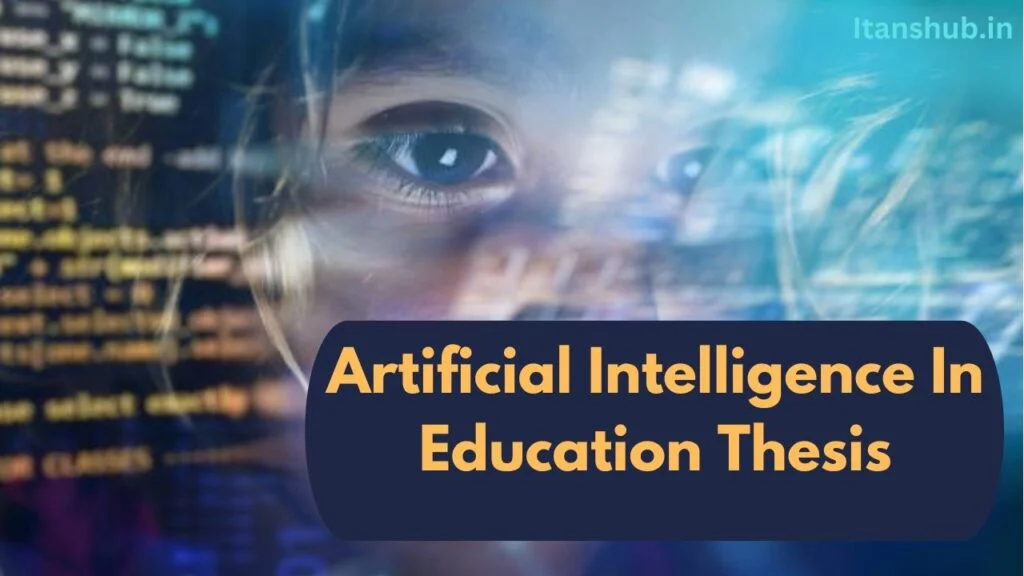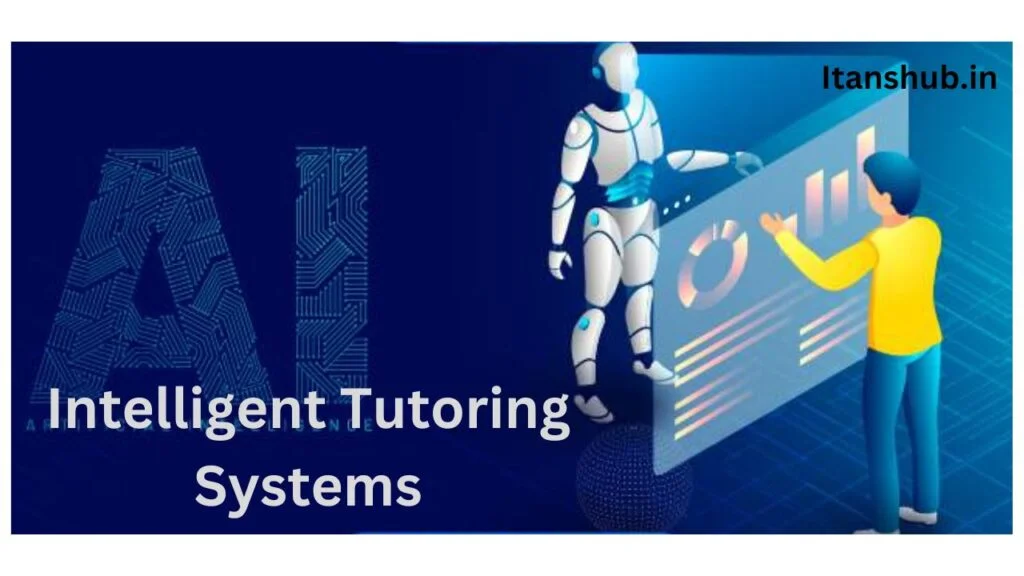Table of Contents
ToggleIntroduction
In recent years, the integration of artificial intelligence (AI) across various domains has gained prominence, and the educational landscape is no exception as we can see. The infusion of AI in education system holds the promise of transforming traditional teaching and learning methods. This article delves into the realm of artificial intelligence in education, examining its definition, transformative potential, and the diverse applications it presents in educational settings.
By the conclusion of (Artificial Intelligence In Education Thesis) this article, readers will have a comprehensive understanding of how AI is reshaping education and the potential benefits it offers for the future of education system.

Definition and Overview
Artificial Intelligence In Education Thesis context refers to the assimilation of intelligent machines and systems capable of executing tasks typically requiring human intelligence. These tasks encompass natural language processing (NLP), logical reasoning, problem-solving, adaptive learning and more.
The objective of AI in education is to enrich the learning experience by delivering personalized and efficient educational tools and platforms. That makes it easier to students. (Artificial Intelligence In Education Thesis)
Captivating Statistics on the Integration of Artificial Intelligence In Education Thesis
According to a report by MarketsandMarkets, the global AI in education market is poised to reach $3.7 billion by 2023, exhibiting a compound annual growth rate (CAGR) of 47.0% during the forecast period.
A survey conducted by the Artificial Intelligence Market in the US Education Sector revealed that 74% of educators anticipate a positive impact from AI on education in the next three years.
In a study by the MIT School of Engineering, students undergoing AI-supported tutoring demonstrated more effective and efficient learning compared to traditional methods.
The Transformative Potential of Artificial Intelligence In Education Thesis
AI possesses the potential to revolutionize education in several ways. Firstly, it can provide personalized learning experiences tailored to the unique needs, abilities, preferences of individual learners and more (This is the main power of Artificial Intelligence In Education Thesis . Adaptive learning platforms, fueled by AI algorithms, enable customization of educational content to match each student’s learning style, pace, and mastery level and more.
Furthermore, Artificial Intelligence In Education Thesis can function as a virtual tutor, delivering interactive and engaging lessons that adapt to students’ performance and provide real-time feedbacks. Intelligent tutoring systems leverage machine learning algorithms to identify students’ strengths and weaknesses, creating personalized learning Artificial Intelligence In Education Thesis pathways for improved educational outcomes in.
Artificial Intelligence In Education Thesis also holds the promise of automating administrative tasks, allowing teachers to allocate more time to meaningful interactions with students. Artificial Intelligence In Education Thesis – powered tools can assist in grading assignments, organizing schedules, and managing administrative duties, enabling educators to provide individualized support.
Highlighting the Overarching Goal of Exploring Artificial Intelligence In Education Thesis
The primary objective of exploring the impact of Artificial Intelligence In Education Thesis is to enhance the learning experience, improve educational outcomes, and prepare students for the future. By integrating AI into educational settings, educators can establish more engaging and interactive learning environments that cater to the diverse needs of students.
Understanding AI in Education
Types of AI in Education
Machine Learning Applications
Machine learning algorithms analyses extensive datasets in educational settings to identify different types of patterns. By processing data related to student performance, behaviour, and engagement, these algorithms offer insights that assist educators in making data-driven decisions and more. This data analysis helps identify areas where students may be struggling, develop personalized learning paths, and enhance instructional strategies. Artificial Intelligence In Education Thesis will help them surly.
Natural Language Processing (NLP) in Educational Tools
Natural Language Processing means NLP, a branch of Artificial Intelligence In Education Thesis, focuses on computer-human language interaction. NLP applications in education include language learning tools, automated essay grading systems, and virtual assistants.
These tools leverage NLP algorithms to analyse and understand human language, facilitating more effective communication and personalized feedbacks. Artificial Intelligence In Education Thesis is most important thing from this point of view.
Intelligent Tutoring Systems

Intelligent tutoring systems (ITS) are AI-powered platforms delivering personalized instructions and feedbacks. Adapting to individual learners’ needs, monitoring progress, and providing tailored guidance, these systems assist students in working at their own pace, identifying misconceptions, and receiving immediate feedback for deeper understanding of any concepts. It is also a power of Artificial Intelligence In Education Thesis.
Adaptive Learning Platforms
Adaptive learning platforms employ Artificial Intelligence In Education Thesis algorithms to deliver personalized content based on each student’s needs. Assessing knowledge, skills, and learning preferences, these platforms generate customized learning materials and activities.
By continuously adapting to students’ progress, these platforms optimize the learning experience, promoting better retention and engagement.
A Brief History of AI in Educational Settings
The integration of Artificial Intelligence In Education Thesis is a relatively recent phenomenon. However, its origins trace back to the mid-20th century when early attempts were made to apply computational techniques to educational settings.
In the 1960s, researchers began exploring the use of computers and programming languages for educational purposes. Over the years, technological advancements, such as machine learning and natural language processing (NLP), have paved the way for Artificial Intelligence In Education Thesis.
Summary
Artificial Intelligence In Education Thesis has the potential to transform education by offering personalized learning experiences, automating administrative tasks, and improving instructional strategies.
Machine learning applications (ML), natural language processing (NLP), intelligent tutoring systems, and adaptive learning platforms represent key AI technologies applied in educational settings. By harnessing the power of Artificial Intelligence In Education Thesis, educators can create more efficient, engaging, and effective learning environments for students, paving the way for the future of education.
FAQs
- What is artificial intelligence in education thesis?
- Artificial intelligence in education thesis explores the impact and potential benefits of integrating Artificial Intelligence In Education Thesis. It investigates how AI technologies, such as machine learning, natural language processing, and intelligent tutoring systems, can enhance the learning experience and improve educational outcomes.
- What is the thesis statement of AI in education?
- The thesis statement of Artificial Intelligence In Education Thesis revolves around the transformative potential of artificial intelligence in shaping the future of education. It emphasizes providing personalized learning experiences, automating administrative tasks, and improving instructional strategies through the application of Artificial Intelligence In Education Thesis.
- How is artificial intelligence used in education?
- Artificial Intelligence In Education Thesis is used in education through various applications, including machine learning algorithms for data analysis, natural language processing in language learning tools, intelligent tutoring systems for personalized instruction, and adaptive learning platforms for customized learning content.
- Which country uses AI in education?
- Artificial Intelligence In Education Thesis is being used in education globally, with various countries incorporating AI technologies into their educational systems. Countries like the United States, China, and the United Kingdom have been at the forefront of AI in education, implementing innovative AI-driven tools and platforms for enhanced learning experiences.
- What is the conclusion of Artificial Intelligence In Education Thesis?
- In conclusion, Artificial Intelligence In Education Thesis has the potential to revolutionize education by offering personalized and efficient learning experiences, automating administrative tasks, and improving instructional strategies.
You Can Read Also This Articles 👇👇👇
The main objective of industrial robots
What are The uses of autonomous robots
What is the work of virtual assistant
What Are Two Successful Application Of AI In Business
Future of AI In Education System
How does AI help in healthcare
How to use machine learning in healthcare
How are autonomous vehicles testbed
How can Artificial intelligence be used in the world of education

I am an Engineer and Passionate Blogger, who loves to share Deep, purified and Latest Information about IT (Information Technology) sector. Read More….

Leave a Reply